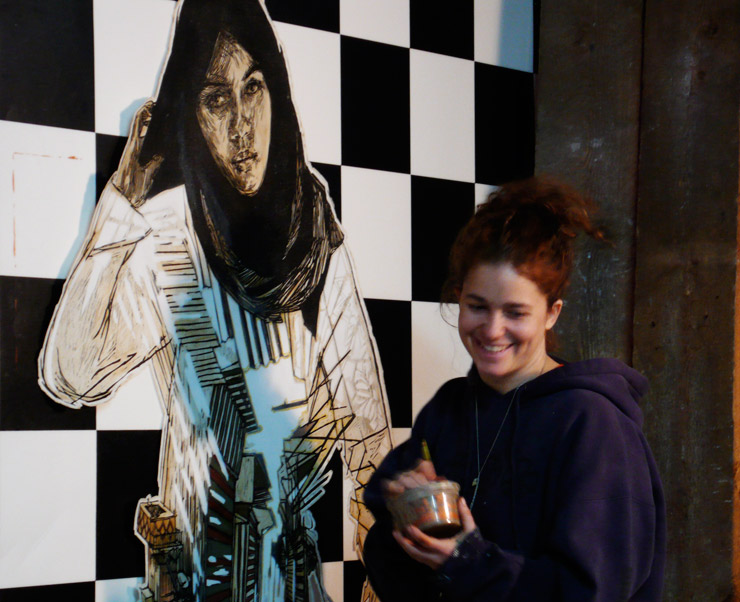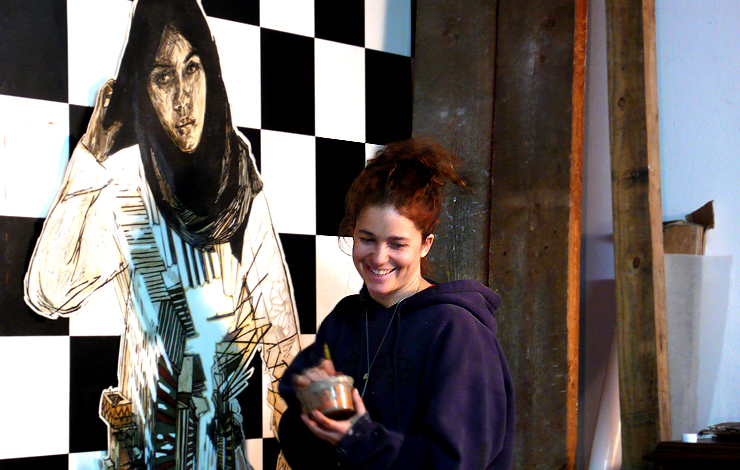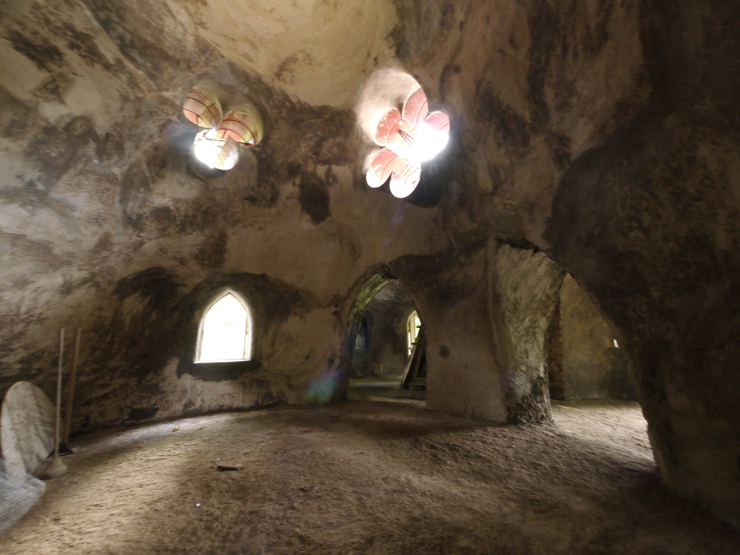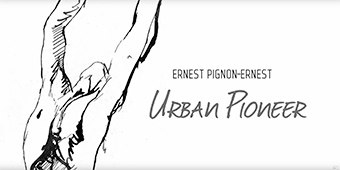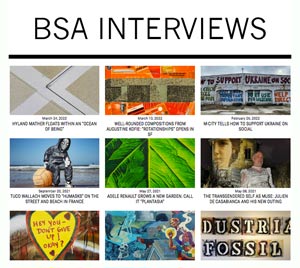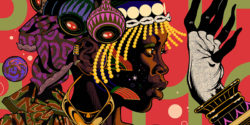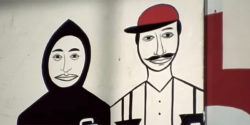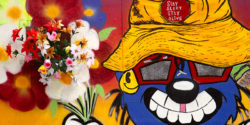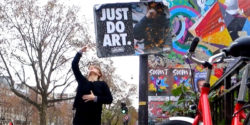A visit to Swoon’s studio is a full immersion into her passions; meditations on humanity, the process of collaboration, and sculptures you can inhabit.
Swoon adding color to the busy streets of “Cairo” (Sunday Afternoon) (photo © Jaime Rojo)
In the rustic warm light of a triple height cavernous space that might have served as a town hall a score of printed artworks on paper lay scattered across the wooden floor. Tiptoeing between the images to cross the formerly grand chamber, the familiar faces of children and adults who you’ve met on walls across the city look up at you. Together these figures, a de facto retrospective of Swoons’ last few years on the street in NYC, are burned into the retina of many a Street Art fan, and yet they lay here on this whitewashed wood-slatted floor without any ceremony at all.
Photo © Jaime Rojo
Around the rooms’ periphery a handful of assistants listen to music, straddle ladders, and attentively stroke warm earth tones on pieces taped to the wall. A rustling cold wind from the black New York night outside is blocked by clear plastic stretched across the windows, buffeting the draft. Swoon, one of Brooklyn’s most celebrated street artists, sits on her knees in the warmly lit room, jar in hand, adding shades of ochre to her piece, “Cairo (Sunday Afternoon)”.
Swoon: So can I just be over here painting?
Brooklyn Steet Art: Yep, wherever you like to be.
Swoon is at ease and at home here in the studio (photo © Jaime Rojo)
Within a couple of days she’ll fly to the west coast to plan her installation of a large interior sculpture, possibly housed in it’s own room, for the upcoming “Art in the Streets” exhibition at the Los Angeles Museum of Contemporary Art with it’s new director and her former gallerist Jeffrey Deitch. Days later, while New York suffers one of it’s worst snowstorms in years, she’ll return with a team to Haiti to begin laying the foundation of the first Konbit House for a woman named Monique and her two daughters as part of the second installment of the Konbit Shelter Project. But tonight she is relaxed and buoyant in this homey hearth of communal activity. This is the beehive environment that she invokes repeatedly throughout her creative life and processes, and one that buzzes with easy conversation.
An assistant works on “The Girl from Ranoon Province” (photo © Jaime Rojo)
Thai food’s just been ordered for the team and in a few minutes everyone will sit at a long makeshift table happily trading stories about the rumored ghosts living in this old building, the Underground Railroad that ferried slaves through Brooklyn, and the coming Wikileaks revolution. But for now we both crouch low on the creaking boards, sometimes kneeling, sometimes sitting cross legged, and talk about whatever comes to mind.
Brooklyn Street Art: I was thinking about how you talk about this internal world in your work being a world that you have dreamt about or you do dream about. And I was thinking about the fact that a lot of peoples work is autobiographical. What part of you is in here?
Swoon: Well you know it depends with each piece. This one is very literally “I went for a walk and I drew it”. Some pieces are much more about bringing together various symbols and some pieces are very much an impression transferred. Sometimes they can be a little bit like a travelogue. This is kind of a sensory recording of a place. And I think that in the form that I bring them together it is a little in that layered, kind of confusing state of dreams. Otherwise I think it’s pretty straight-forward.
As she speaks and dabs the brush in a tub of hand-mixed hue she appraises the urban pathways she has created in the robes of the woman in the piece.
Brooklyn Street Art: Sometimes places are confusing anyway on their own.
Swoon: Totally.
Brooklyn Street Art: So maybe you capture some of that confusion too.
Swoon: Yeah (chuckles), and I really am attracted to those places; Those kind of winding labyrinth-like cities and all of those places. I feel like I’m always kind of looking for them.
Three of Swoon’s street pieces in the process of hand coloring (photo © Jaime Rojo)
Brooklyn Street Art: What are you dreaming about these days?
Swoon: Hmmm, well I guess I’ve started a lot of dreaming about building things. Which is unusual I guess finally because…
Brooklyn Street Art: Maybe it’s because you’ve been building things!
Swoon: (Laughs) Yeah like it’s finally coming through! No, but really like the problem-solving process. Like, “I’m trying to put this roof on!”– which weirdly never happened.
She refers to the first Konbit Shelter she and a team completed in Haiti as part of an art installation/ sustainable housing project she spearheaded in 2010 as a response to the earthquake which shook the nation one year ago.
An assistant works on “Sambhavna” (photo © Jaime Rojo)
The conversation quickly reminds her of word she’s today received that gives her the go-ahead for a brand new project of a similar nature in Brazil.
Swoon: I just got news yesterday that there is a new project, that I’m pretty excited about, is going to be possible.
Brooklyn Street Art: Excellent! Congratulations.
Swoon: There’s these people in Brazil who are organizing this project with this museum and one of the things that was sort of part of the goings-on in this neighborhood is this train station. It is getting cleared out because there are a lot of homeless people living in this station. And I was like, “What’s happening with the train station? What’s happening with everyone?” And the guy was like, “ Well, they’re going to a shelter”. And then I was thinking about how sometimes people don’t like to go to shelters.
Brooklyn Street Art: Right, a lot of times they avoid them.
Swoon: And so I remembered that I had seen this place in Miami called Umoja Village – it was a thing where this group of activists had found a law on the books in Miami that (said) you cannot be arrested for taking care of your basic life necessities. And so they took it one step further and said, “We’re going to organize people to take care of their basic life necessities together” – so you don’t have the vulnerability of sleeping outside by yourself, you don’t have access to services, you don’t have access to healthcare, all of these things. So they organized people together into this village and they were still sort of independently living in their houses that they had put together. – But they had access to counseling, and they cooked meals together ..
“Sambhavna” and “The Girl from Ranoon Province” (photo © Jaime Rojo)
Brooklyn Street Art: So city services eventually did enjoin them at some point?
Swoon: Not really, no, it was pretty much an independent initiative and it had some resistance, and then some support. And I actually haven’t, I need to find out for curiosity, found out what their current status is. So anyway, I think that we are actually going to join up with some people in Sao Paulo and actually work on creating a crazy sculpture which at the same time can function as optional housing for people who are getting moved out of the train station. And they said they would bring on some community organizers, some mental health people, and build a kitchen.
Brooklyn Street Art: Thank God.
Swoon: And there will be like..
Brooklyn Street Art: Fire codes, little things like that?
Swoon: Actually fire was a really big problem with Umoja so that was a really good thing that you bring up because that thing burned down. So that is something that we really have to consider.
Detail of “Sambhavna” (photo © Jaime Rojo)
“Sambhavna” in the wild. A street birthday gift to a friend that lives nearby. (photo © Jaime Rojo)
The introduction of a new project that includes a sculpture that people can live in? A collective that coalesces around constructing it? Why does this new project sound so familiar? Her street art figures are often singular, but Swoon’s process for creation is more often than not colorfully collaborative. The thought of getting an approval for this new idea frightens her a bit, as the beginning of any huge public/private art initiative can summon fears of complications and quagmires. After talking for a few minutes Swoon notes that she’ll have help from many differently talented individuals for this new live-in scultpure, and that makes her happy.
Brooklyn Street Art: Do you think it might serve as a model for something else in the future?
Swoon: I think everything you do does, for better or worse. I mean, it will, if it works. It depends on what happens. I mean it could serve as a model that says, “Okay that was a total disaster”
Brooklyn Street Art: Here’s something to avoid!
Swoon: Don’t ever do that again! Or it could be, “this thing worked and let’s think about it some more”
Brooklyn Street Art: Well, it seems like it is kind of like the Konbit Shelter Project idea, right? You’ve completely put it into place with the collaboration of a number of different people and talents.
Swoon: Yeah.
Brooklyn Street Art: And it is serving as maybe a template for this future work?
Swoon: I think maybe so, as far as small groups working in a certain way. And of course you know we took a template from someone else.
Brooklyn Street Art: I see.
Swoon Konbit Shelter. Bigones Village, Haiti. Photo courtesy Upper Playground © Tod Seelie
Swoon: We borrowed this engineered architecture style and so it’s like we took some working processes and we wanted … I think ours was almost a thought process too. Like, how can you, as an artist who isn’t a big NGO, that isn’t an aid organization, still be involved in a way that is offering something permanent?
Brooklyn Street Art: Have people from NGOs taken an interest and inquired about the project in Haiti?
Swoon: I think a little bit. Yeah, not a ton.
Brooklyn Street Art: Those buildings you created look like beehives to me. Where does “Konbit” come from?
Swoon: That word is an awesome word that is apparently pronounced like “Coom bee” and it
Brooklyn Street Art: I think I understand, is it like a combination?
Swoon Konbit Community Center Inside. Haiti. Photo Courtesy Upper Playground © Tod Seelie
Swoon: No, I think it’s a Creole, or I think it’s a Haitian word, and what it means, what it refers to is the time when the harvest is ready and there is usually too much work for any one person to do, people will cooperatively harvest each others farms together. So it is the word that means working together cooperatively when things need to get done. And we were like, “That’s beautiful. That’s really what we want to try to do.”
Brooklyn Street Art: You had like thirty people working together.
Swoon: Totally. And I think it’s about the US and Haiti, and starting to make that partnership that way as well.
Brooklyn Street Art: You feel like it’s been a good partnership so far with the US and Haiti?
Swoon: Well…. (laughs), with us and that village – it’s a really good partnership. I don’t mean that in the political boundaries sort of way.
Photo © Jaime Rojo
Swoon. One of her most popular pieces on the street. (photo © Jaime Rojo)
Brooklyn Street Art: So it occurs to me that with so many of your large expansive art projects what you have been doing is creating giant sculptures that people can live in or interact within.
Swoon: That’s starting to happen, yeah
Brooklyn Street Art: Well even in the Swimming..
Swoon: Oh, the boats!
Brooklyn Street Art: Yes the boats, and in these shelters, and when one is walking into your exhibits, like the one at Deitch – you feel like you are walking through sculpture and around it, interacting with it, seeing through it. And then I think of the work of Gordan Matta-Clark and those buildings that he turned into sculptures and it is amazing how no matter how many different projects you are doing there is a narrative thread that goes through all of them.
Swoon: Yeah, I sometimes get that crisis of ; “How is this related?”, but I don’t really live in that for very long. I’m just like, “whatever”, it will become apparent. Because it doesn’t really matter, it doesn’t have to be related. And then in the end it’s related anyway.
A view from above (photo © Jaime Rojo)
Brooklyn Street Art: A lot of Street Artists, as you know, prefer to work singularly. – They like to hide out in caves and do their work, secretly run out, put it up, and run back in. But this room has many people working in it. You are always working collaboratively.
Swoon: Yes a lot of the time. My drawing, I do by myself. This, what we are doing, is the painting, the sort of “afterwards”. But the drawing I have to do by myself for sure. It’s more focused. I can’t really get to that kind of focus if I’m around other people.
Brooklyn Street Art: Do you draw daily? Weekly?
Swoon: It depends on what’s happening. Daily if I can, and then sometimes I won’t draw for two months.
Brooklyn Street Art: Did you get a lot of drawing done when you were in Haiti?
Swoon: None. We were like, dead tired every single day. You know, it was like, “Up with the sun”, and then you would get home and you’d be like, “Oh my God Paypal has frozen our funds!” And then you would email for four hours figuring out how to deal with that crisis, and then try to put a picture up on your blog and fall on your face and sleep, so I didn’t do drawing.
Detail (photo © Jaime Rojo)
Brooklyn Street Art: It is back breaking work, but you had your creature comforts…
Swoon: We did actually, at that place. This next time around we’re going to be living in the place where we built. It’s now a community center so right now no one is actually living there at night. So I think that will be better because before we were staying at this nice house a little bit outside of the village, which was nice because we had the Internet. But I’m looking forward to staying in the village.
Brooklyn Street Art: Is the first Konbit Shelter going to be used as a community center? Is that still being debated about what to use it for?
Swoon: I think that it is slowly… because there isn’t any furniture in it, and we didn’t paint it. It can be used. But I feel like it’s not fully embraced yet. So I think once we go back and really put the finishing touches on get started on another house then it will be a little more.
Brooklyn Street Art: I haven’t seen much of your work on the street recently.
Swoon: I haven’t done anything on the street in the City in a long time.
Brooklyn Street Art: Maybe in the spring time?
Swoon: I’ve gotten into a weird thing where I neglect New York entirely.
Brooklyn Street Art: You’re done with it maybe?
Swoon: No, maybe it’s because when I’m home I’m so busy. There’s definitely something going on though, there is some neglect.
Brooklyn Street Art: When you come to New York you are all about work, no play.
Swoon: Kind of. In a bit of a sad way actually. I don’t really have friends here anymore. I just kind of blow through.
A large collaboration in the Wynwood District of Miami with Ben Wolf in 2009 (photo © Jaime Rojo)
Brooklyn Street Art: What about Florida?
Swoon: No I just go to the ocean when I’m there, and hang out with my little brother. Otherwise Florida is my little zone home.
Brooklyn Street Art: Well that piece that you did in the Wynwood District last year is still there.
Swoon: Yeah that big mural?
Brooklyn Street Art: On that rounded corner of a building…
Swoon: It’s pretty weird. It was fun doing that, I mean it was fun learning. It’s a bizarre mural in every way, but I’m glad we did it.
Brooklyn Street Art: Me too, I’m glad it still looks good, wasn’t destroyed.
Conversation quickly turned to the Thai food delivery that presently arrived. Everyone jumped from their perches on ladders and stools and knees to arrange themselves around a table to share a meal and many lively stories. With Swoon in attendance, there will surely be many stories to come.
With very special thanks to Heather Macionus.
Read more about the new Swoon print for the Konbit Shelter from Upper Playground.
Donate the the Konbit Shelter Project via Paypal
Photo © Jaime Rojo
Other Articles You May Like from BSA:
Traveling around Berlin this weekend we took a couple of trains and an unexpectedly looooong walk into the neighborhood of Tegel in search of Urban Nation's huge One Wall installations that we haven't...
Our Weekly Interview with the Streets A new installment in Specter's series of portraits of New York's homeless individuals (photo Jaime Rojo) Specter (detail) (photo Jaime Rojo) ...
A fine artist who likes drawing and wood burning, TIKA also does her share of aerosol and stylized typography and characters across concrete bricks, along train tracks, and on the occasional van just ...
In Amsterdam the temperature is above freezing and the trees are beginning to show little buds on the branches. With any luck this new “spring offering” by Skount and Pau Quintana Jornet will usher in...
Mumbai is a city that captures the essence of Indian culture and tradition. When people think of Mumbai they may envision Bollywood actors executing their hook steps in flashy outfits with bright col...
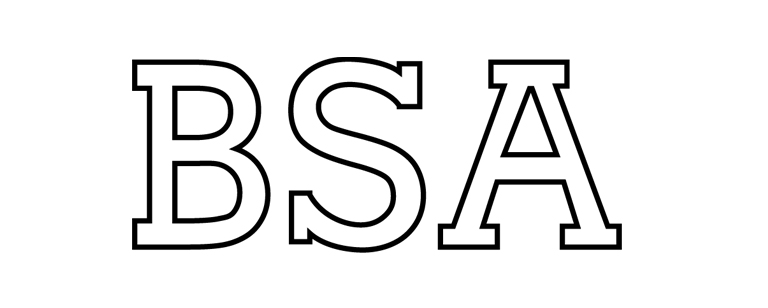 BROOKLYN STREET ART LOVES YOU MORE EVERY DAY
BROOKLYN STREET ART LOVES YOU MORE EVERY DAY